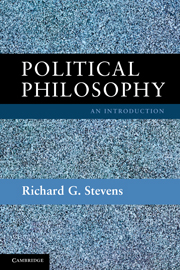Book contents
- Frontmatter
- Contents
- Acknowledgments
- Prologue
- Part I The Nature And Origin Of Political Philosophy
- Part Two The Problem Of Political Philosophy
- Part III The Permutations Of Political Philosophy
- 7 Ancient and Medieval Political Philosophy
- 8 A Kind of Betrayal
- 9 Modern Political Philosophy and Postmodern Thought
- 10 Ancients and Moderns
- Epilogue
- Index
10 - Ancients and Moderns
Published online by Cambridge University Press: 05 June 2012
- Frontmatter
- Contents
- Acknowledgments
- Prologue
- Part I The Nature And Origin Of Political Philosophy
- Part Two The Problem Of Political Philosophy
- Part III The Permutations Of Political Philosophy
- 7 Ancient and Medieval Political Philosophy
- 8 A Kind of Betrayal
- 9 Modern Political Philosophy and Postmodern Thought
- 10 Ancients and Moderns
- Epilogue
- Index
Summary
In the fifteenth chapter of “The Prince,” Machiavelli states unequivocally that he means to depart from the ancients who talked of “cities that never were” and to teach rather “the effectual truth.” He makes it plain throughout the Discourses on Livy that he means to introduce “new modes and orders.” In that fifteenth chapter of “The Prince,” he indicates those new modes and orders by writing a burlesque of Aristotle's Ethics. In the Ethics, Aristotle taught that virtue is a mean between two extremes, one of excess and the other of defect. Machiavelli, in a way, also treats virtue as a mean, but instead of presenting several triads of which the middle in each case is a virtue, as Aristotle had done, Machiavelli's mean is an alternation between the praised thing and the blamed thing, depending on circumstances. In other words, virtue in Machiavelli's sense is knowing when to do what ordinary people call “virtuous,” knowing when to do what those ordinary people call “vicious,” and doing what needs to be done, no matter what those old fools in ancient times taught. This is the “more effectual truth” about politics.
As Leo Strauss put the matter, Machiavelli, like Moses, never reached the Promised Land. Certainly, however, the cadre of young men he sought followed him and succeeded in an intellectual revolution that most importantly gave us all a new moral outlook. It is almost true to say that we are all Machiavellians. Being reminded that St. Augustine had opposed those Romans who, keeping true to their devotion to the pagan gods of earlier Rome, blamed Roman Christians and Christianity itself for the weakness of Rome that allowed Alaric and the Visigoths to sack the city in 410, we note, as was mentioned earlier, that Machiavelli re-echoes the praise of pagan religion over Christianity. He must, of course, do so deviously. Again relying on Strauss, the whole of the Discourses seems to call Christianity to account before the wisdom of Livy, then seems to debunk Livy by the evidence of Roman history, and then, finally, seems to undercut the authority of Rome itself. He does this, however, by suggesting in “The Prince” that Christianity is an effeminate religion, what with its turn-the-other-cheek demands, and that what the Italian states needed was the manliness – the virtù – of the ancient Roman religion, infused as it is with satisfyingly bloody sacrifices to its gods, to fight off the incursions of the ultramontanes, the French in particular. This illustrates well the lesson of Chapter 15 of “The Prince” that the old morality needs to be replaced by “the more effectual truth.” To see a more brazen dismissal of Roman history, however, one needs to read his play, the Mandragola (The Mandrake). Besides the portrayal of the Church, in the person of Brother Timothy, as utterly corrupt, venal, and hypocritical, Machiavelli's telling of the seduction by Callimaco Guadagno of the hitherto chaste wife, Lucrezia, is a deliberate show of contempt for the most sacred moment in Roman history, as Livy tells the story, namely the rape of Lucretia that is presented as the impetus for the overthrow of the Tarquinian tyranny and the establishment in 509 b.c. of the Roman Republic. One might as well write a play that portrays George Washington as a founding member of the Liars’ Club, in a play that is a kind of “If I Did It” version of the chopping down of that blasted cherry tree.
- Type
- Chapter
- Information
- Political PhilosophyAn Introduction, pp. 282 - 302Publisher: Cambridge University PressPrint publication year: 2010



